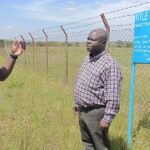By Aghan Daniel I daghan@afsta.org
A new consortium on cereals and legumes, which aims at fostering partnerships on the crops breeding will focus on collaboration and investment by the private sector, a leading expert has said.
While addressing delegates at the 24th African Seed Trade Association Annual Congress on March 5, in Mombasa, Dr. Solomon Gizaw, Head of the Technologies for African Agricultural Transformation (TAAT) Clearinghouse said that the consortium will enables sharing genetic resources and breeding techniques to superior crop varieties.
A statement from AFSTA Secretary General, Dr Yacouba Diallo, noted that the initiative, African Cereal and Legume Breeding Consortium (ACLBC) will foster partnerships between governmental organisations, research institutions, and private entities to expedite the development of high-yielding, pest-resistant, nutrient-rich and climate-adapted cereal and legume varieties.
“With a focus on collaboration and investment, this consortium seeks to enhance farm-level productivity and contribute to economic growth by leveraging the strengths of both the public and private sectors,” said Yacouba.
ACLBC has been established by a partnership between the African Seed Trade Association (AFSTA) and the International Institute of Tropical Agriculture (IITA) through the Technologies for African Agricultural Transformation (TAAT) Programme, as an integral part of the AfDB Feed Africa Strategy the focal emphasis of such a consortium is multifaceted.
Primarily, it enables sharing genetic resources and breeding techniques to superior crop varieties. Private sector participants invest in crop breeding research, seed multiplication and distribution channels, which facilitate farmer access to seeds of improved crop varieties by farmers more rapidly than the public programmes alone could achieve.

The consortium also serves as an incubator for innovation in plant breeding technologies, harnessing cutting-edge techniques like molecular breeding. Moreover, it creates commercial opportunities for businesses involved in agri-inputs production and marketing with reference to seeds, agrochemicals, farming equipment, and other related services.
Benefits of joining the consortium
In order to join the consortium, private seed companies must be members of AFSTA.
“Non-profit organisations like research institutes and universities can only join ACLBC if International Institute of Tropical Agriculture (IITA) invites them; however, they cannot be full members,” added Dr Gizaw.
Every year, he noted, members can ask for seeds of up to three different types of crops, such as Maize, Rice, Wheat, Sorghum, Millet, Soybean, and particular crops, including the High Iron Bean (HIB), as long as those seeds are available and can be moved safely between countries.
“Upon receiving the seeds, members will have the sole rights to use them for two years, but this is based on agreements over intellectual property and testing with the technology providers. The seeds can only be requested after all export and quarantine protocols have been met,” said Dr Gizaw.
Various delegates at the Congress observed that the formation of breeding consortium, represents a contemporary step towards an integrated approach that builds on years of experience in plant breeding, agronomic research and seed system development within Africa.









